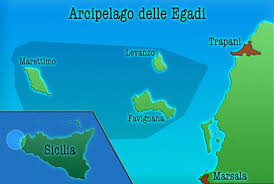Home - In and around
THE EGADI ISLANDS IN TRAPANI IN SICILY
The Egadi Islands in Trapani in Sicily are protected by the Sicilian Region, being a Site of Community Interest, they are located about 7 km from the western coast of Sicily. and include three islands:
The "Aegadian Islands" Protected Marine Area consists of 53.992 ha of sea.
It is the largest protected marine area in Europe.
Since 2001 it has been assigned to the Municipality of Favignana.
The flora contained in the area includes over 400 species.
The fauna has a large variety of both permanent and migratory birds.
History
The last glaciation created a natural passage between Africa and Sicily, this favored ancient human settlements mainly in Levanzo.
In 241 B.C. the Romans conquered the islands after the final naval battle of the First Punic War. After the fall of the empire the islands fell into the hands of the Vandals and the Goths and later the Saracens.
In 1081 they were occupied and fortified by the Normans.
Then followed the fate of Sicily until the sixteenth century, when they became the property of the Pallavicini-Rusconi of Genoa and then, in 1874, the Florio who enhanced the tonnare of Favignana.
Typical dishes based on couscous, and specialties related to fishing.
- Favignana,
- Levanzo
- Marettimo
- two islets, plus a series of rocks and stacks.
The "Aegadian Islands" Protected Marine Area consists of 53.992 ha of sea.
It is the largest protected marine area in Europe.
Since 2001 it has been assigned to the Municipality of Favignana.
The flora contained in the area includes over 400 species.
The fauna has a large variety of both permanent and migratory birds.
History
The last glaciation created a natural passage between Africa and Sicily, this favored ancient human settlements mainly in Levanzo.
In 241 B.C. the Romans conquered the islands after the final naval battle of the First Punic War. After the fall of the empire the islands fell into the hands of the Vandals and the Goths and later the Saracens.
In 1081 they were occupied and fortified by the Normans.
Then followed the fate of Sicily until the sixteenth century, when they became the property of the Pallavicini-Rusconi of Genoa and then, in 1874, the Florio who enhanced the tonnare of Favignana.
Typical dishes based on couscous, and specialties related to fishing.



